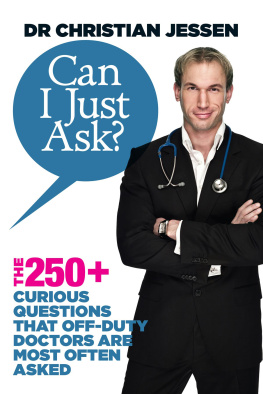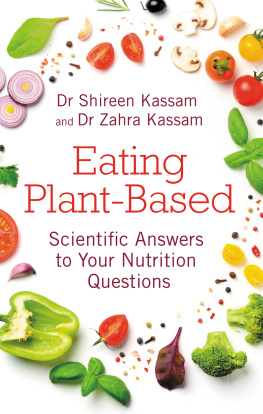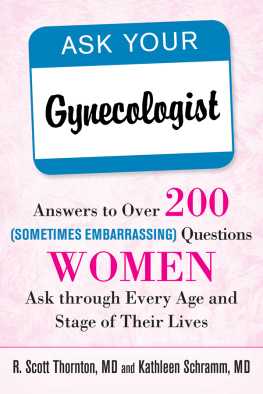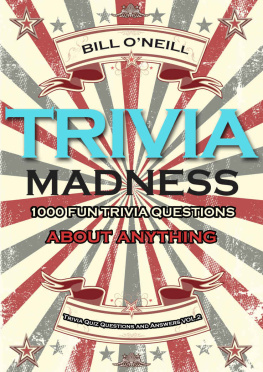
Christian Jessen, 2010
The moral rights of the author have been asserted.
All rights reserved. No part of this book may be reproduced by any mechanical, photographic or electronic process, or in the form of a phonographic recording; nor may it be stored in a retrieval system, transmitted or otherwise be copied for public or private use, other than for fair use as brief quotations embodied in articles and reviews, without prior written permission of the publisher.
The information given in this book should not be treated as a substitute for professional medical advice; always consult a medical practitioner. Any use of the information in this book is at the reader's discretion and risk. Neither the author nor the publisher can be held responsible for any loss, claim or damage arising out of the use, or misuse, or the suggestions made or the failure to take medical advice.
A catalogue record for this book is available from the British Library.
ISBN 9781848504226 in Mobipocket format
ISBN 9781848504233 in Epub format
Introduction
There is one constant about doctoring that is universally agreed upon by all medics: we are never, ever off duty. I dont mean that if someone collapses in the street we must go running to help, or if a passenger is taken ill on a plane we are obliged to go to their aid (though of course we are!). I mean in everyday life, during everyday conversations. Family gatherings all too often turn into mini-clinics, with brothers wanting to ask about this mole or that lump, aunts wanting info on which is the best HRT for them, and ever-wary grandparents wanting to check up on their own GPs competence in prescribing the correct blood pressure tablets. At nearly every conceivable occasion, once we have revealed our chosen trade, the questions quickly come rushing in and by the hundreds, too. Dinner parties are definitely the worst. The more wine the guests drink, the bolder the questions get things people have clearly been desperate to ask for years, but can only query under the liberating influence of wine and good food, never in the austere environs of their local GP surgery.
This got me thinking. Perhaps it would save us doctors a lot of breath if I collected together all the questions we get asked. Perhaps it would actually be a good reference book? After all, of whom can you ask all these questions? You cant make an appointment with your GP just to ask what your appendix does. Maybe your question seems just too silly to waste anyones time over (Does chewing gum really stay in your system for seven years if you swallow it?). Perhaps the question is a little morbid and might cause raised eyebrows (Do we poo ourselves when we die?) or is just too buttock-clenchingly embarrassing to ask anyone, ever (Why does my vaginal discharge smell so bad?). The Internet contains vast amounts of information, but how do you know if the site you are looking at is accurate and up to date?
So I decided to put together this collection of the most common and curious questions that we doctors get asked. I sat down and talked with colleagues, and made notes of many of the things I get asked, both in the clinic and out. I went through old letters and emails, thought of every person who ever stopped me in the street or at a party with a question, and recalled as many drunken dinners as I could. Ive even thrown in lots of top 10 lists and boxes of interesting facts and figures to keep you hungry for more.
So now you dont have to ask anyone out loud, and you can let us docs forget about medicine and allow us to enjoy our dinners out, free to gossip about The X Factor and not X chromosomes, because its all here instead, divided neatly into sections to help you find the answer to your particular mystery. It covers male and female problems, sex, diet and fitness, and even some oddities that I couldnt fit into a conventional pigeonhole (Will I get arthritis if I crack my knuckles?). If you have a certain condition and want to find out more, or just want to know some extraordinary facts about your body, this is the book for you.
I have also become increasingly aware of the considerable number of myths circulating around, mistakenly advising that such-and-such a behaviour is guaranteed to improve health. Im sure many are recommended in good faith, but medicine has come a long way and we really shouldnt be propagating this sort of nonsense any longer. The advice that you drink two litres of water a day, avoid carbohydrates if you want to lose weight, detox regularly and try homoeopathy are just some of the 21st-century health mantras that are often unquestioningly accepted and in my view are pure hokum so I cover as many of these as I can, too. And dont get me started about chiropractors
Dr Christian Jessen
London 2010
www.drchristianjessen.com
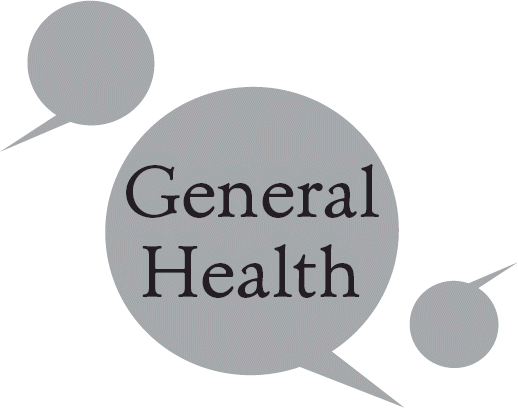
Should you really feed a cold? And if so, why is chicken soup always recommended?
Eating not only helps your body to combat a cold, but can also help you feel better. Dutch researchers have found that eating stimulates the very type of immune response that destroys the viruses that cause colds. Their experiments showed that six hours after we eat a meal, our levels of gamma interferon a substance produced by infection-fighting cells and involved in the process by which T cells destroy cells attacked by a foreign invader (pathogen) increase fourfold. By contrast, gamma interferon levels actually drop in people who drink only water when they have a cold.
Not just any old food will do, though. You need to choose a healthy, balanced diet. Chicken soup has been offered to the bed-bound since the dawn of time, and it seems the gesture is not at all futile. The soup has anti-inflammatory properties, and some studies have shown that it can reduce the movement of the white blood cells that can cause congestion and other undesirable cold symptoms.
What about starving a fever?
Most doctors would advise you to stick to a normal diet whether you have a fever or not. Some research even suggests that fasting during an illness may be dangerous. As we learned from the question above, restricting food intake hinders the immune systems ability to respond to an infection, because it deprives key cells of the energy they need to produce proteins that recognize invaders and target them for destruction.
Did You Know Your hearing is less acute after a large meal. Musicians and singers often avoid eating before a concert for this very reason.
Why do we have earwax? And what is the best way to remove it?
Earwax is a useful substance that your body produces to protect and clean the ears. It has a number of important functions: it cleans, lubricates and protects the lining of your ear by trapping dirt and repelling water. It is also slightly acidic and has antibacterial properties. Without earwax, the skin inside your ear may become dry, cracked and infected, or waterlogged and sore.
The rate of earwax production is usually fairly steady, but if you get colds or have a lot of allergies then you may produce more. It can build up and become blocked, which will affect your hearing. People have one of two types of earwax: dry or wet; it is the wet type that can get blocked up. Never use cotton buds, as they just push the wax further into your ears and impact it. Forget those ear candle things, too; they will do nothing except drip hot wax on you. Chewing gum can help shift it (by chewing it, not sticking it in your ear), and olive oil in the ear will soften it and help it work its way out.
Next page
